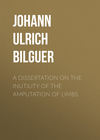Buch lesen: «A dissertation on the inutility of the amputation of limbs»
ADVERTISEMENT
By the English Translator
It is with particular pleasure I present the English reader with a translation of Mr. Bilguer's celebrated performance: It will meet, I doubt not, with the approbation of those, who have the true honour of surgery at heart, and are at the same time friends to humanity. After what is said by so eminent a judge as Dr. Tissot, as well as many others who are an ornament to the profession, I shall not launch out into any eulogium on the author: there is a spirit of modesty, candour and ingenuity runs through the whole, that to every sensible reader will prove a sufficient recommendation of the work. – If it in the least contributes to check the cruel and precipitate practice of taking off limbs that might be saved, thereby preserving the lives, as well as preventing the mutilation of numbers of our fellow creatures, I shall think myself amply recompenced for the labour I have taken in thus endeavouring to render Mr. Bilguer's beneficent design more extensively known.
TO
Dr. PRINGLE,
Physician in Ordinary to Her Majesty, Fellow of the Royal Society, &c.
SIR,
Your excellent work on the Diseases of the Army, so useful to physicians in general, will always be considered as a standard for the practice of those in particular, who are intrusted with the important office of superintending the health of the soldiery. Mr. Bilguer has performed, on his part, what you have so ably done on yours, in pointing out to his colleagues and successors, the plan which they ought to follow. It has given me pleasure to translate his Dissertation, and you must derive a peculiar satisfaction from the perusal of it, because, from the extensive and painful experience you have had of the bad consequences resulting from the operation this able Surgeon so warmly opposes, you can more readily perceive the usefulness and value of this little work. It is therefore my duty to address it to you, and I eagerly embrace so favourable an opportunity of thus publicly declaring the sentiments of esteem and particular respect, with which I have the honor to be,
Sir,
Your most humble, and Most obedient Servant,TISSOT.
Lausanne,
1 April, 1764.
PREFACE,
By Dr. TISSOT
An extract of the Dissertation, of which I now publish a Translation, had given me a very high opinion of it; but on a perusal of the whole, I found it still better than I had imagined: It seemed to me one of the most useful and best executed performances on Surgery, and I hoped it would very soon be translated into French.
Eighteen months having elapsed without any such translation appearing, I thought of procuring one. I then endeavoured to find a translator, but failing in that, I determined to do the office my self. I imagined, that, in thus dedicating a few hours of my time to this work, I should do a considerable service to many unfortunate people. I shall rest well satisfied if, by rendering this excellent book more common, I prove the means of adding to its influence, and of inducing a great number of surgeons, who may now read it, to quit the cruel and fatal practice of amputation, for the method which Mr. Bilguer proposes, with a degree of sincerity and precision which leaves no room for doubt.
The title of the original is, Dissertatio inauguralis medico-chirurgica, de membrorum amputatione, rarissime administranda aut quasi abroganda, quam, pro gradu doctoris medecinæ et precipue chirurgiæ rite consequendo, die vigesima una Martii, A. S. 1761. In alma Regia Fridericiana speciminis loco, publicæ eruditorum censuræ submisit, Johannes Ulricus Bilguer, curia-rhœtus generalis præfectus chirurgorum exercitûs regii Borussici.
This work contains a much greater variety of matter than its title implies, for it not only shews the inutility and danger of amputation, by several arguments, to which many others might be added; but not satisfied with levelling a tottering edifice, Mr. Bilguer frames and describes a plan for preventing and curing those accidents, which oblige surgeons to have recourse to amputation; and this is properly the most considerable and most essential part of the performance, which is, in fact, a treatise on gunshot wounds.
I have scarcely done Mr. Bilguer justice with regard to style: I hope, however, I have given his meaning, without depriving it of its perspicuity or strength. This work will begin a new æra in Surgery, and will reach posterity. I should have been sorry in any shape to have disfigured it.
It will give me very great pleasure, if the pains I have taken, and the notes I have added, prove agreeable to the author. He may be convinced that, being engaged in business as I am, his performance must have appeared to me extremely well executed, and much wanted, before I undertook to translate it.
I am informed he has lately published a work on Surgery, in the German language; I am persuaded it contains much valuable matter: He seems to me to have a genius for discovering new expedients to lessen the sufferings of human kind. I would have given this book the title of a Manual for the Surgeons of the Army, which it deserves to be, were there not already another so called1, which, although very little known, is by no means contemptible. The author had, even at that time, remarked that wounds of the tendons are not troublesome, owing to their want of sensibility, that the actual cautery is seldom proper; and some other facts, almost forgotten since that time. He describes wounds near the articulations with dislocation and fracture, he points out the accidents attending gunshot wounds, and, what deserves notice, he only admits of amputation in one case; namely, that of an incurable mortification, and mentions it as a cruel and doubtful expedient. I shall here cite his own words; they plainly shew that, if he lived in our time, he would be one of the most zealous encouragers of the new method, since he was so sensible of the defects, and grieved at the barbarity of the old. “If, unfortunately,” says he, “a mortification, from whatever cause it proceeds, gains ground in such a manner as to baffle all our care and applications, there is then no expedient left but that of taking off the limb; the success of which is very uncertain, for if it be dubious in a healthful subject, it must be much more so in one which is otherwise: It is, however, the only method, dreadful as it is, of putting astop to the ailment, and saving the rest of the body. This nevertheless ought not to be done, except when the consent, age and strength of the patient permit us to try so dangerous an experiment.”
This author's manner of thinking is very far from being established as might be wished, amputations being still too frequent. Mr. Bilguer's work ought at this time to be so much the more favourably received, as a celebrated company, whose decisions ought to have great weight in matters relating to surgery, has formally declared, about seven years ago, That amputation is absolutely necessary in gunshot wounds, complicated with fracture of the bones; and have left unfortunate wounded men no other alternative, but that of losing the injured limb on the spot, or a few hours later. That line of Juvenal seems very applicable on the occasion:
Nulla unquam de morte hominis cunctatio longa est.
SECTION I
Having resolved some little time since to publish in this learned university a Dissertation which might serve as a specimen of my Medical Acquirements, the subject which appeared the most suitable to my purpose, is one, that may improve the art of surgery, which I practised for several years during the heat of the late bloody wars, and may at the same time wipe away the old aspersion, first broached at Rome against Archagates, and so often repeated since, that surgeons are executioners, who cut and burn without mercy.
The cutting off a limb being the severest means employed in surgery for the relief of mankind, an operation which every one beholds with horror, I cannot, I imagine, more effectually accomplish my design, or do a greater service, than by demonstrating, that the cases wherein amputation is necessary, are much less frequent than has been hitherto supposed, and that it may even be almost totally dispensed with.
SECT. II
My first thoughts on this subject arose from observing what passed under my own inspection in the military hospitals.
In the first place I remarked, that in a very great number of cases, where amputation was judged necessary by the physicians and surgeons of the army, and even by the wounded themselves, in order to preserve life, it seldom or almost never answered the end.
In the second place, I saw and had under my immediate care, a great number of patients whose limbs had been carried off by cannon balls, and in such a manner too, that all those who adhere to, and are afraid to deviate from established rules, would have performed a fresh amputation on the remaining stumps, whom I cured, as far as they were capable of being cured, without having recourse to such disagreeable means.
And lastly; many others, whose limbs were not intirely separated off, but so much detached, wounded, shattered and contused, that the ablest surgeons deemed it necessary to take them wholly off, were nevertheless, by my endeavours, contrary to the general opinion, cured without amputation.
SECT. III
This success, partly owing to the efforts of nature, and partly to the means employed by art, strongly encouraged me almost never to have recourse to amputation, but to try every kind of remedy, internal as well as external, calculated to preserve the lives as well as the limbs of the unfortunate sufferers. My first attempts, so far from being unfavourable, confirmed me more and more in the opinion, that parts which have sustained the most considerable injuries, will much oftener get well than what is commonly believed: And although this opinion does not seem to be countenanced by many eminent physicians and surgeons; although I do not flatter myself I shall be able to induce them to alter their sentiments, I hope nevertheless, that some others, encouraged by my example, and this account of my success, will have the courage to follow the same method, and that their authority may afterwards contribute to convince the most incredulous.
SECT. IV
But supposing, what I do not apprehend can be the case, that all the gentlemen of the profession should agree in declaring my method absolutely useless, the rest of mankind at least, will be obliged to me for my endeavours to mutilate the wounded as little as possible; as most people are shocked at the mention of any amputation, or at the sight of a poor creature who has lost an hand, an arm, a foot or leg, wretchedly crawling along upon crutches or a wooden leg; and consider the total privation of a limb, as a much greater misfortune than when it is preserved, though perhaps unshapely, and uncapable of performing several of its primitive functions. If one reflects how much every body dreads the pain occasioned by the slightest incision, he will easily conceive the degree of horror a person must feel at the thought of amputation, and why many patients chuse rather to die than to submit to it2. Hence it is so uncommon to find men, like count Mansfeld, so famed in the war that lasted thirty years, who caused his wounded arm to be taken off amidst the sound of trumpets and beating of drums; or like the country fellow, whom Dr. Schaarschmid, late an eminent physician at Berlin, mentions in his collection of observations and remarks on physic and surgery, who cut off his own mortified leg with a saw, very unfit for such an operation3.
SECT. V
But lest I should be charged with being weakly influenced by the cries of the patient, and with wanting that kind of fortitude which Celsus4 thinks requisite in a surgeon, in treating of this operation, I shall take it for granted that the patients are men like those I have just now mentioned, and that an inordinate desire of life, an uncommon strength of mind, religion, and other moral reasons, induce them to consider pain as nothing, when it affords them any hope of preserving life.
It is foreign to my plan to inquire who was the first who attempted this operation, or to trace the history of it in the works of the ancients. I shall only take notice, that such wounded men as recovered, after having lost a limb by some accident, without doubt, shewed the possibility, and suggested the first hint of trying this operation. Neither shall I dwell upon the various methods of performing it from the infancy of the art to the present time; they are described in other books5, and I do not purpose giving a compleat treatise on amputation. I shall not even touch upon what is already generally known on this subject, but as little as I possibly can: This is the best way of handling any particular point; and I hope all those who pay more regard than I do to scholastic form, will pardon my inattention to regularity of method and stile, when they are informed how much my time is engaged; others will excuse me, when they call to mind the remark of Celsus, that diseases are cured by proper remedies, not by a display of eloquence.
SECT. VI
To prove what I have advanced, I shall begin with enumerating those accidents for which amputation has been hitherto deemed necessary. I shall reduce them to six.
First, A mortification, which spreads till it reaches the bone.
Secondly, Any limb so greatly hurt, whether by fracture or dilaceration, that there is room to dread the most fatal consequences, a mortification and death.
Thirdly, A violent contusion of the soft parts, which has at the same time shattered the bones.
Fourthly, Wounds of the larger vessels, which convey the blood into the limb, either, as the only means of stopping the hemorrhage, or through the apprehension the limb should perish for want of nourishment.
Fifthly, An incurable caries of the bone.
Sixthly, If any part is either attacked with a cancer, or is in danger of being so, it is customary to take it off.
I shall treat of these different accidents more or less particularly, in proportion to the number of observations I have made on each of them, as no method of cure, however doubtful and alarming, should be rejected, till a better can be pointed out. Thus, this treatise contains only, in effect, an account of the methods I successfully employed in the military hospitals, for the relief of the above disorders; together with a few observations, and still fewer hypothetical reasonings, which induced me to condemn the use of amputation.
SECT. VII
I shall begin with an account of the means I make use of, internal as well as external, when a limb is mortified, the effects of which have convinced me, that in such cases amputation is not necessary; and here I shall first gratify the curiosity of those readers who, doubtless, are desirous to know what I have learned from the extensive opportunities I must necessarily have had, with respect to the use of the Peruvian bark.
Experience has taught me, that this admirable medicine is possessed of a singular and specific virtue in mortifications.
I know that several physicians and surgeons only recommend it in those which proceed from weakness. I have heard it reported by others, that they found it of little service after the famous battle of Dettingen6. But perhaps the other circumstances, with regard to the treatment of the patient, did not contribute to promote those good effects which I always observed attended it when judiciously administered. And I make no doubt, but every practitioner who, in prescribing it in cases of mortification, observes the rules laid down by Dr. Pringle, Dickins, Wade, Cheselden, Douglas, Rushworth, Amyand, Shipton and some others, will find it very efficacious. I do not mean, nevertheless, that it should be considered as the only internal medicine; there are, doubtless, other bitters which are sometimes extremely proper on these occasions. I must add, that the bark appears to me to possess that quality which Celsus requires in medicines, whether in a solid or liquid form, adapted to the cure of a mortification, to bind the belly moderately, and brace the whole system. After having treated of the external applications, I shall point out the method in which I administered the bark.
I shall here subjoin five questions.
Would Mr. Bilguer have amputated in these two instances?
Would not his method have saved both these patients, especially the last?
Does not amputation seem to have contributed to their death?
Does it not evidently appear, that in the latter of these two cases, amputation destroyed the good effects of the bark, which seemed to conduct the patient to a speedy cure; and that in the former case, the bark had not power sufficient to repair the mischief occasioned by the amputation?
Does it not follow from these two observations, that however salutary the effects of the bark may be, those of amputation are hurtful in a greater degree? Tissot.










